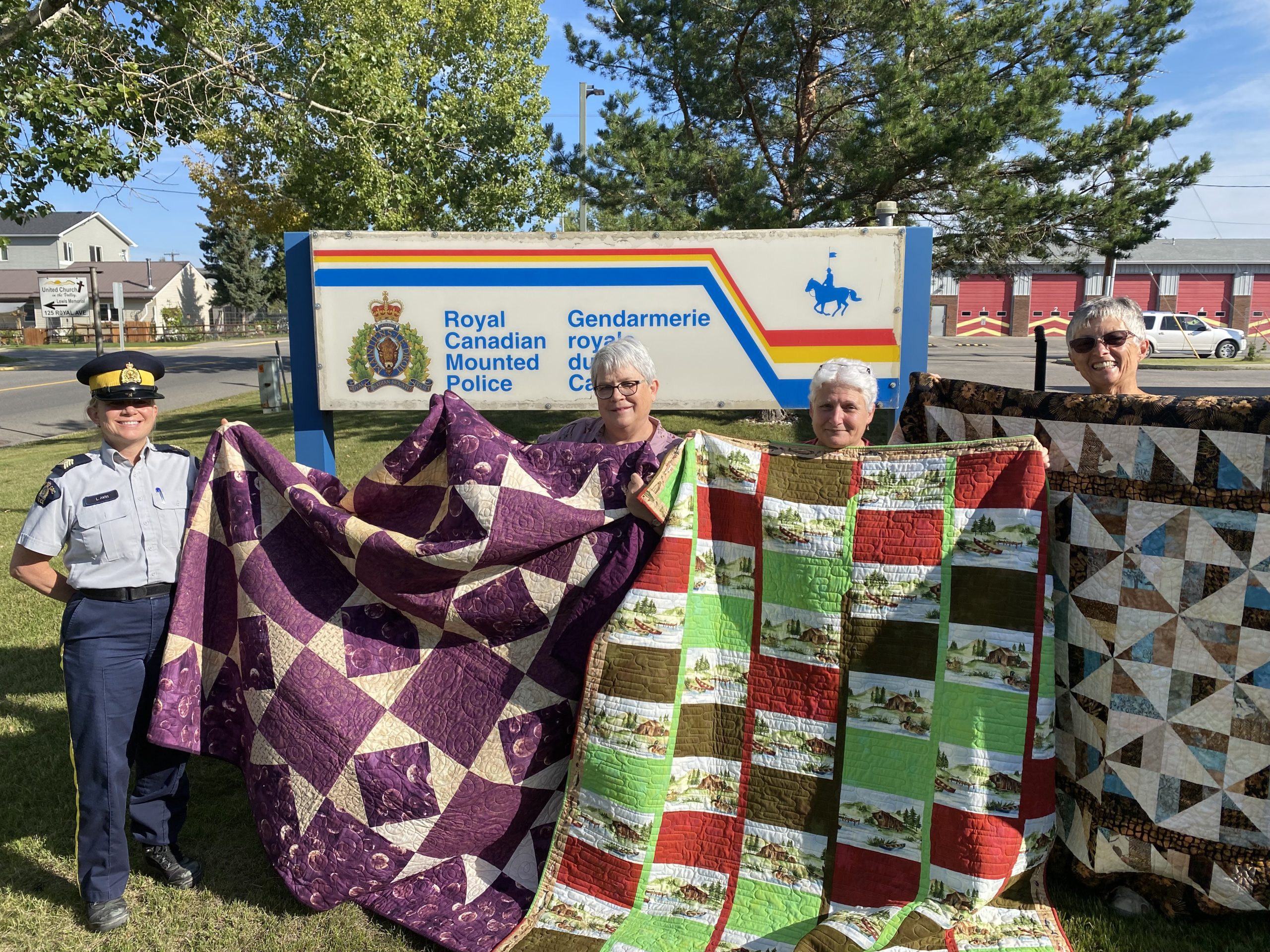When a person is struggling with their mental health, even one small gesture of care and kindness can make all the difference in the world. Just the knowledge that there is one person out there who truly cares can give a person in crisis the motivation they need to begin walking the road toward healing.
Patti-Jo Haley learned this firsthand when her son experienced a traumatic workplace accident leaving him with PTSD. After the accident, Haley says her son received very little support or acknowledgement from his workplace.
“It was a very difficult time for all of us, to watch him go through that,” Haley recalls. “There was no acknowledgement of what he was going through, the attitude was very much ‘get over it.’ But that’s not an easy thing to do.”
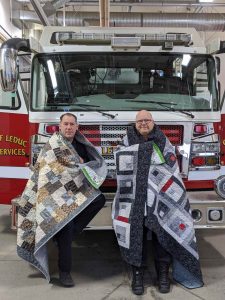
Pictured: Firefighters Mike Skinner and Daniel Sundahl, Leduc Fire Services
Haley says her son’s first real strides toward healing came with the realization that there were people in his life who did genuinely care. Meanwhile, Haley’s daughter, a First Responder, was struggling with the reality that many of her coworkers were experiencing mental health crises of their own, often struggling to function at work and even falling victim to self-harm and suicide.
“One of the things I’ve learned through having one child with PTSD and another who is a First Responder,” Haley says, “is that one of the things people really struggle with when it comes to mental health is the lack of acknowledgement and recognition.”
That was when Haley decided she wanted to help enact positive change in her own way, through her love of quilting. In the beginning, Haley reached out to a few of her daughter’s coworkers and friends, sending them each a handmade quilt.
“There’s a lot of comfort in the ‘making’ side of it,” she explains. “A lot of time and effort goes into making a quilt. There’s hours and hours of work. When a First Responder wraps themselves in one of our quilts, they now have a physical reminder that someone out there cares. Someone out there is thinking of them. Someone out there, even just one person, is there to support them.”
But Haley’s small quilting operation based out of Turner Valley, AB, quickly blossomed through word of mouth. More people and community organizations began reaching out to request quilts for their First Responder loved ones and clients. As the demand grew, much to Haley’s surprise, volunteers began stepping up to help.
And thus, Quilts for Everyday Heroes was born.
“We are an organization that provides quilts to first responders with PTSD, or in crisis,” Haley explains. “It also stems into the wellness end of things—outreach and recognition.”
Haley says having one child living with PTSD and another who is a First Responder has put her in a unique position to understand the unique mental health challenges faced by Responders, as well as the stigma they encounter when it comes to getting the help they need.
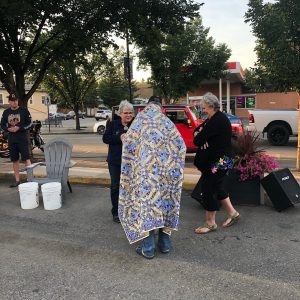
The Rolling Garage stop in Okotoks, Alberta
“A lot of First Responders will tell you that when they struggle with mental illness, there’s not a lot of support out there for them,” she adds. “They’re kind of just left out to dry. As we work through this project, it’s our hope that we’ll create a greater awareness that people can reach out and get the help they need. They don’t have to live with that stigma.”
Haley says while a simple quilt may seem like a small gesture, there is symbolic meaning in receiving a handmade gift that has been made especially for you with love and care. It’s an acknowledgement that someone out there truly sees you, even if that person is a perfect stranger.
Quilts for Everyday Heroes was founded in 2018, and in the four years that have passed the organization has grown significantly. This year, Haley says Quilts for Everyday Heroes has sent more than 400 quilts to First Responders across Canada. They make special quilts for active and retired members of the military and RCMP personnel, many of whom have been involved in shootings and other traumatic events. In collaboration with other groups and individuals, throughout the pandemic they have also provided 150 quilts to ICU nurses, which Haley says has kept them busy.
Additionally, Quilts for Everyday Heroes provided quilts to EMS personnel who attended a hate crime incident in London, ON in June 2021, when a Muslim family was killed in a premeditated truck attack.
“First Responders have to come home to their families and kind of leave everything on the doorstep, everything they’ve seen, everything they carry,” Haley says. “We’ve never been there, but we want them to know we understand. We appreciate and acknowledge the sacrifices they make day to day, which is why we call them everyday heroes.”
As the organization grew, so did the need for help. But Haley says finding volunteers, surprisingly, hasn’t been an issue. Community is woven into the very foundations of Quilts for Everyday Heroes’ operations, from the ground up. The organization is entirely volunteer-run, from the quilters themselves to the ones who donate money and supplies, and even those who assist with logistics and distribution.
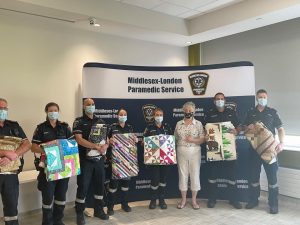
Members of the Middlesex-London Paramedic Service show off their new quilts
“It’s way bigger than I thought it would ever be,” Haley admits. “It’s funny, every time I find myself thinking ‘we could really use a few more hands’ or ‘we’re running a bit low on supplies’ it’s like whatever we need just appears. People want to help. As the need grew, the more people who were in need of quilts, people just stepped up to the plate. We’ve been so blessed that way.”
One of the biggest barriers as the initiative has grown has been managing shipping costs. But these costs can be offset by financial donations, which can be made through their website. Through the website you can also donate supplies, become a volunteer quilter or nominate a loved one to receive a quilt. All donations go back into creation and distribution, and are vital to the organization’s ongoing national expansion.
Surprisingly, operations at Quilts for Everyday Heroes didn’t suffer after the onset of COVID-19. In fact, it was quite the opposite. With more time to dedicate to quilting, production actually increased significantly.
“It’s been an exceptionally busy year,” Haley says. “Our volunteers recognize the good that they’re doing and they just keep going. It never ceases to amaze me how people step up when they’re needed.”
As the organization has grown, Quilts for Everyday Heroes has partnered with various community outreach and mental health organizations geared toward supporting First Responders. These include OSI-CAN, Project Trauma Support, Legacy Place Society, The Rolling Barrage and more.
Haley says that, when she can, she tries to be there in person to deliver the quilts to provide that extra personal touch. “To be able to physically wrap these Responders in the quilt is part of the experience,” she explains. “We like to say we’re wrapping them in compassion.”
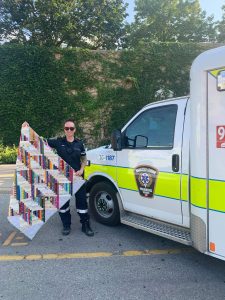
Pictured: Jenn Cripton, Middlesex-London Paramedic Service
Another personal touch that makes these quilts extra special to receive is the personalized label sewn inside. It serves as a physical, tangible representation of their service, which First Responders don’t often get.
“I talked to a Corrections Officer who had been assaulted at work,” Haley recalls. “For 10 years this woman had worked in Corrections, and when she struggled, when she had to leave because she could no longer do her job, she had to turn in her uniform. She had to turn in her badge. She had to turn in her identity, basically. She had nothing to show for those 10 years other than the trauma and the scars that she had been left with. So, the acknowledgement of that quilt we gave her with her name and everything on it was very powerful for her.”
According to Haley, one of the biggest things that has changed between now and when she first launched Quilts for Everyday Heroes is the increased willingness First Responders are showing to come forward. Four years ago, many of the quilt recipients preferred to remain anonymous rather than come forward about their mental health struggles. Today, things have become much more transparent, and there is more awareness and acceptance than ever before. Haley says this is a testament to the progress that has been made in the area of First Responder mental health. Often, she says just knowing someone is there makes it easier to come forward.
“More and more these resources are becoming accessible, and easy to find. Our hope is just for them to know that we support them,” she continues. “Before there was this air of shame. But today, we sometimes get letters from people telling us their story, what their journey has been like and how the quilts have helped them. You didn’t get that level of sharing before, but now more and more people are learning that if you do reach out, 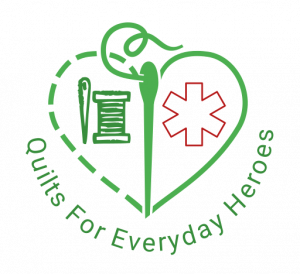 the support is there.”
the support is there.”
Still, Haley is quick to remind us that we’re not out of the woods quite yet. “There’s a lot more work to be done to help our First Responders who do so much for us,” she says. “It seems like a small thing, but it seems to make a big difference and we’re just so grateful that we’re able to be part of that.”
***
Photos submitted by Quilts for Everyday Heroes
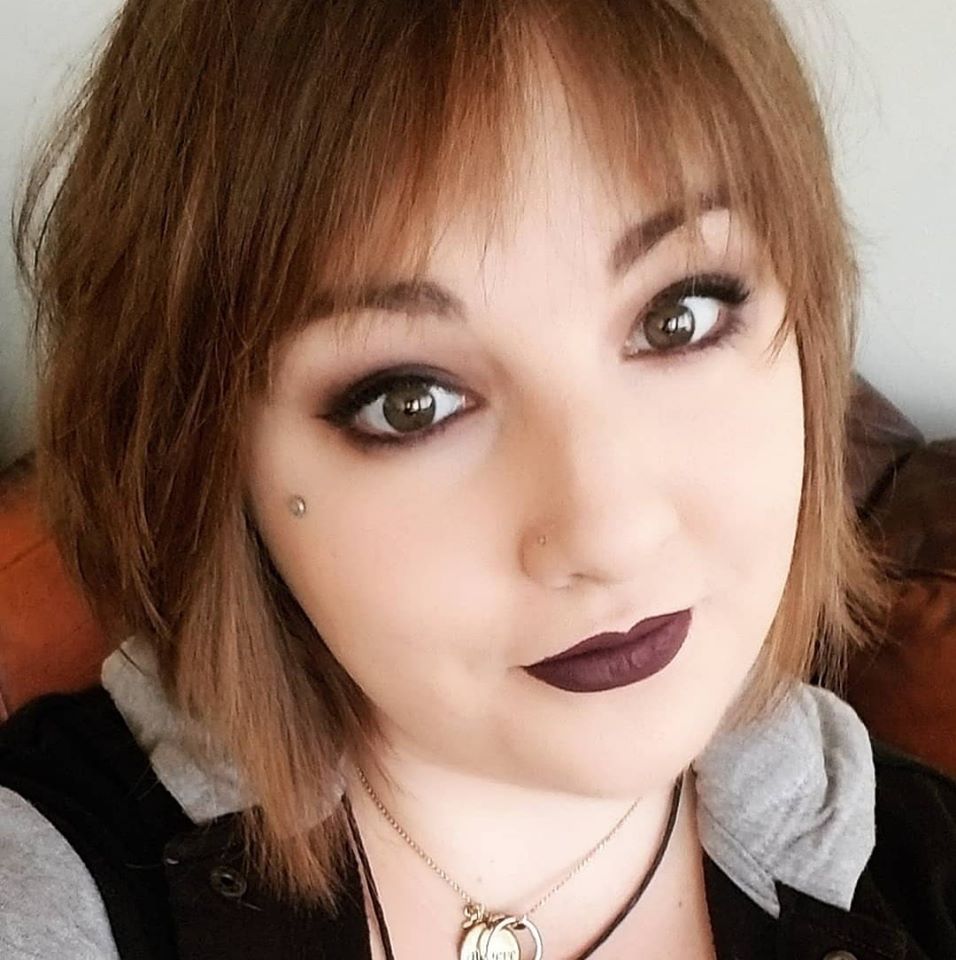
Victoria St. Michael is a multimedia content creator with experience producing high-quality print and digital content. Victoria graduated with an Honours Degree in Digital Journalism from the University of Ottawa and a Journalism Diploma from Algonquin College, and has bylines in publications across North America. With an avid interest in humanitarian and global issues, she hopes to use her unique voice to help build a well-informed, forward thinking and progressive Canada.


